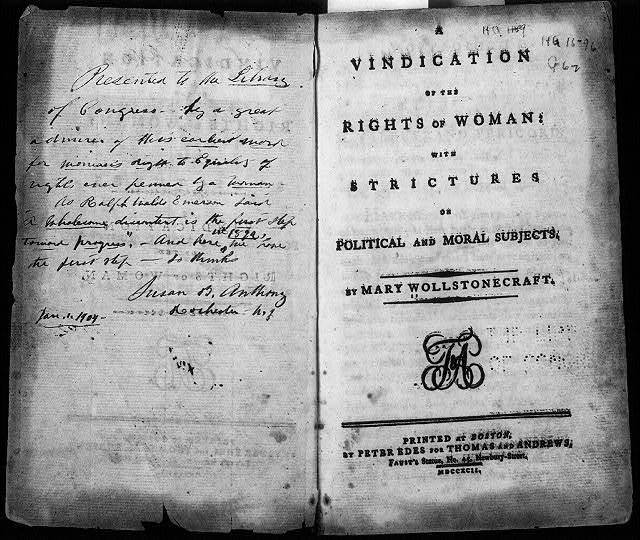Wollstonecraft Resource Library
Thoughts on the Education of Daughters (1787)
In this work, Wollstonecraft discusses the importance of an education of the mind and soul of young women. She condemns the “fashionable education” of the day that focused on “exterior accomplishments” and left women unequipped to take care of a family and raise children, and to live good and meaningful lives.
Original Stories from Real Life (1788)
Wollstonecraft’s Original Stories communicates themes about virtue, character, goodness and beauty, following the adventures and everyday life of two young girls and their wise teacher, Mrs. Mason.
The Female Reader: Or Miscellaneous Pieces in Prose and Verse; Selected from the Best Writers, and Disposed under Proper Heads; for the Improvement of Young Women (1789)
Mary Wollstonecraft compiled a collection of texts for the moral, philosophical, practical, and religious education of girls. It contains a wide variety of authors and sources, from Shakespeare to Scripture, to her own original prayers.
A Vindication of the Rights of Woman (1792)
Wollstonecraft makes a case for the freedom of women to be educated and to pursue virtue. She engages with philosophers and moralists like Rousseau and John Gregory, criticizing their belief in the inferiority of women that is used to justify their superficial education.
19th Century American Readers of Wollstonecraft
Hannah Mather Crocker (1752-1829)
Hannah Mather Crocker published the first book-length philosophical work on women's rights, critically engaging Wollstonecraft's Rights of Woman. Like Wollstonecraft, Crocker grounds the equal intellectual capacities of the sexes in the Imago Dei, views friendship as the foundation of marriage, celebrates women's natural duty to care for their children, and argues for reforms to the education of girls.
Lucretia Mott (1793-1880)
Lucretia Mott, Quaker abolitionist and co-author of the Declaration of Sentiments and Resolutions (Seneca Falls, 1848), was an early reader of the Rights of Woman and the most influential expositor of Wollstonecraft's thought.
“Let [woman] cultivate all the graces and proper accomplishments of her sex, but let not these degenerate into a kind of effeminacy, in which she is satisfied to be the mere plaything or toy of society, content with her outward adornings, and with the tone of flattery and fulsome adulation too often addressed to her. True, nature has made a difference in her configuration, her physical strength, her voice,— and we ask no change, we are satisfied with nature. But how has neglect and mismanagement increased this difference! It is our duty to develop these natural powers, by suitable exercise, so that they may be strengthened ‘by reason of use.’”
Sarah Grimké (1792-1873)
Quaker abolitionist Sarah Grimké was also an early reader of the Rights of Woman. In her Letters on the Equality of the Sexes, she begins with a Scriptural exegesis of Genesis, thereby basing her account of women's equality on a Biblical basis. In her essay, Marriage, she refutes a published claim associating the women's rights movement with "free love."
“‘God said, it is not good that man should be alone, I will make him an help meet for him’ [Gen. 2:7-18]....it was not, therefore, merely to give man a creature susceptible of loving, obeying, and looking up to him...It was to give him a companion, in all respects his equal; one who was like himself a free agent, gifted with intellect and endowed with immortality; not a partaker merely of his animal gratifications, but able to enter into all his feelings as a moral and responsible being. If this had not been the case, how could she have been an help meet for him? ”
“The Doctrine that human beings are to follow their attractions, which lies at the base of that miscalled “free love” system, is fraught with infinite danger. We are too low down to listen for one moment to its syren voice.... Let me then exculpate ‘’the woman’s rights movement,’’ from the charge of ‘tending directly and rapidly to the Free Love system, and nullifying the very idea of Marriage as anything more than a partnership at will.’ On the contrary our great desire is to purify and exalt the marriage relation and destroy all licentiousness....In marriage is the origin of life.”
The Revolution
The Revolution was a women’s rights newspaper founded by Susan B. Anthony and Elizabeth Cady Stanton. It serialized Mary Wollstonecraft’s Rights of Woman and published many articles that engaged with or built upon her work.
Caroline Wells Healey Dall (1822-1912)
Dall was a feminist, anti-slavery advocate, scholar, and reader of Mary Wollstonecraft. Her book, The College, the Market, and the Court defends the reputation of Wollstonecraft, and argues for a place for women in education, labor, and law.
*The development of this page is in process, more to come.
Last updated 01/09/24


